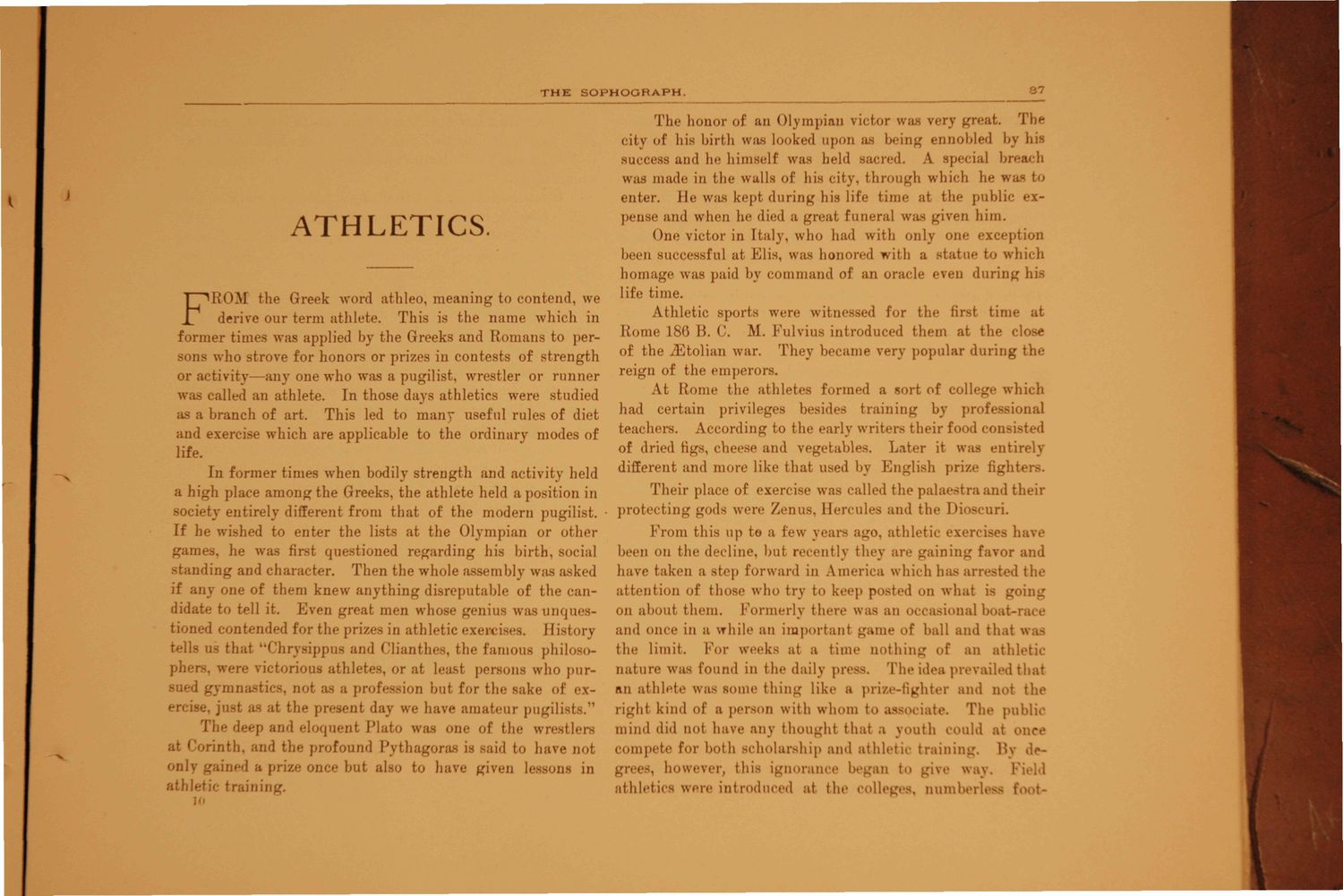Caption: Sophograph - 1890
This is a reduced-resolution page image for fast online browsing.

EXTRACTED TEXT FROM PAGE:
THE SOP] lOGRAPH. 27 ATHLETICS. ROM the Greek word athleo, meaning to contend, we derive our term athlete. This is the name which in former times was applied by the Greeks and Romans to persons who strove for honors or prizes in contests of strength or activity—any one who was a pugilist, wrestler or runner was called an athlete. In those days athletics were studied as a branch of art. This led to many useful rules of diet and exercise which are applicable to the ordinary modes of life. In former times when bodily strength and activity held a high place among the Greeks, the athlete held a position in society entirely different from that of the modern pugilist. If he wished to enter the lists at the Olympian or other games, he was first questioned regarding his birth, social nding and character. Then the whole assembly was asked if any one of them knew anything disreputable of the candidate to tell it. Even great; men whose genius was unquestioned contended for the pri in athletic exerei . History tells us that "Chrysippus and Clianthes, the famous philosophers, were victorious athletes, or at Least persons who pursued gymn; . nor a- a pro! -ion but for the sake of ex1 erei just as at the present day we have amateur pugilists/ The deep and eloquent Plato was one of the wrestlers at f'orinth. and the profound Pythagoras is said to have not Only .ined a prize om but al i have given 1. ns in athletic training. I The honor of an Olympian victor was very great. The city of his birth was looked upon as being ennobled by his success and he himself was held sacred. A Bp lal breach was made in the walls of his city, through which he wa.s to enter. He was kept during his life time at the public expense and when he died a great funeral was given him. One victor in Italy, who had with only one except n been successful at Klis, was honored with a statue to which homage was paid by command of an oracle even during 1 F life time. Athletic sports were witne d for the first time at Rome 186 B. <'. M. Fulviua introduced them at the close of the i'Etolian war. They became very popular during th reign of the emperors. At Home the athletes formed a sort of college which had certain privileges besides training by professional teachers. According to the early writers their food coi d of dried tigs, cheese and vegetables. Later it was entirely different and more like that used by English prize fighters. 1 'heir place of exercise was called the palaestra and their protecting gods were Zenus, Hercules and the Di< uri. From this up te a lew years ago, athletic exercises hav been on the decline, but recently they are gaining favor and have taken a step forward in America which has an d tl; attention of those who try to keep posted on what is going on about them. Formerly there was an occasional boat-nu * and once in a while an important game of ball and th.it was the limit. For weeks at a time nothing of an athlet: nature was found in the daily press. The idea prevailed that an athlete was some thing lik. i prize-fighter and n the right kind of a person with whom to associate. The publi mind did not have any thought that a youth could at one Compete for both scholarship ami athletic training. 1 de- gi however; this ignorance lx an to gi\ way. Fi athletics were introduced at the colleges, numberless t t-
|